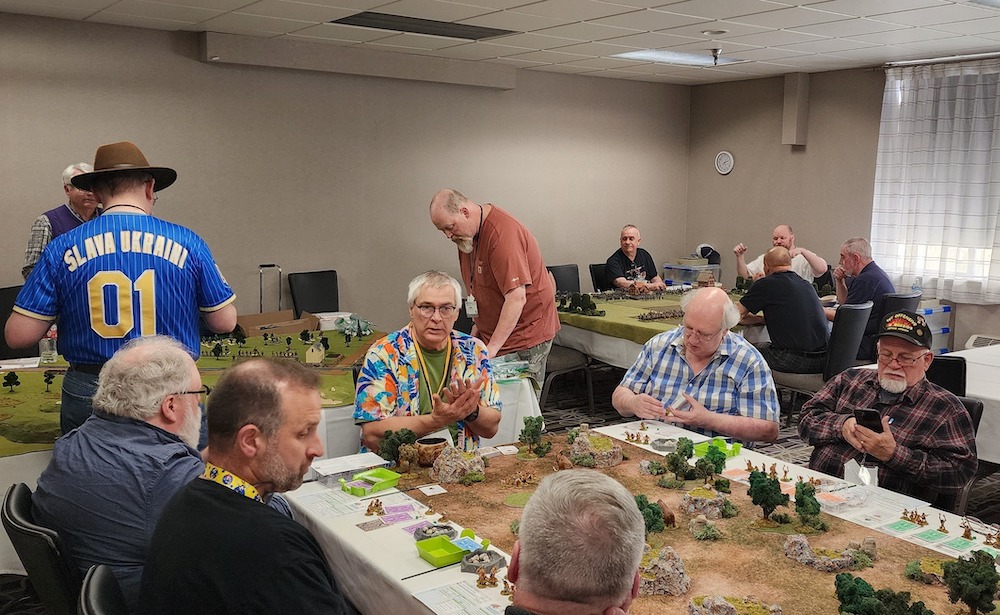
- Details
- By Chez Oxendine
- Indigenous Entrepreneurs
Damond Crump loves designing games, but hates marketing them. After creating tabletop war games like Patrol: WW2, Crump’s usual procedure was to design, write and format a set of rules, then post them on an online marketplace.
That approach brought him a few sales, Crump said, but not many. Pacific Sky Games changed that. The Edgewood, Wash.-based games distributor and newly formed publisher’s owner Bryan Shein, a Cherokee Nation citizen, helped edit and publish the latest version of Patrol: WW2’s rulebook, then promoted the game on podcast and convention circuits.
The strategy worked. Crump sold more games in his first few months with Pacific Sky Games than in the previous five years combined.
“Like many in the hobby, I am an introvert. My skill was in doing research and writing games, but the marketing and selling was something that I was completely uncomfortable with,” Crump said. Partnering with Shein solved that problem.
Pacific Sky Games launched its publishing model in late 2024, abandoning two decades of distribution work. The company had distributed games through conventions, game stores and international markets since 2002, growing from demonstrating war games in convention halls to worldwide distribution.
Shein said physical distribution was getting more expensive and complex because of inflation, and as tariffs threatened the industry, it made sense for the company to make a change. With some tariffs now in place, Shein said he's glad the company was "agile" enough to shift its model in time.
“Rather than being this great big whale that needed to take a lot of time to turn, we wanted to act like the minnow,” Shein said. The pivot was timely — tariffs that took effect this year would have crushed the distribution business, he said.
Shein saw a bigger problem: traditional publishers exploit game designers. Publishers routinely strip creators of the rights to their own rules and share little of a game's profits.
“We had authors out there that were working really hard for the benefit of these larger corporations,” Shein said. “We felt that there had to be a better way, and that's when we reconfigured (the company).”
 Bryan Shein, Pacific Sky GamesBy pivoting to publishing, Pacific Sky Games aims to create a platform where independent creators can earn a decent living by bringing their games directly to market. Shein wound down the company's distribution operations and began focusing on helping designers edit, print and market new rulesets for tabletop war games, which utilize miniatures to simulate battles. Under PSG's publishing model, designers keep the rights to their rules, receive marketing support online and at game conventions, and sell their work through PSG's online store — keeping 60% of profits.
Bryan Shein, Pacific Sky GamesBy pivoting to publishing, Pacific Sky Games aims to create a platform where independent creators can earn a decent living by bringing their games directly to market. Shein wound down the company's distribution operations and began focusing on helping designers edit, print and market new rulesets for tabletop war games, which utilize miniatures to simulate battles. Under PSG's publishing model, designers keep the rights to their rules, receive marketing support online and at game conventions, and sell their work through PSG's online store — keeping 60% of profits.
“From what I've heard, that's a very generous offer, and it's in line with our goals,” Shein said. “We want to see independent authors make games both because they love to do it and because they can sustain themselves.”
The model also aims to tap into a tabletop gaming market that grew during the COVID-19 pandemic's lockdowns. The market surge has proven resilient, according to a Morning Brew analysis. The report said the tabletop gaming market was valued at approximately $13 billion in 2023, with expectations to reach $32 billion by 2032.
The report found that 37% of gamers reported increased engagement with tabletop games since before the pandemic, showing a lasting shift in consumer behavior. The data shows an industry in flux — one where digital channels, direct-to-consumer deliveries and a renewed emphasis on in-person experiences are reshaping how game rules and products are sold.
The tabletop market is more stable than the broader gaming industry, and Shein plans to tap it through an "aggressive" release schedule for PSG's published games.
“We've got a lot of different things in the mix: sci-fi games, an alternate history game, a game about the Pacific Air War during World War II and others,” Shein said. “We're planned out for 2026 and beyond, and I think the outlook is very promising.”
PSG has five authors signed up, including Crump, with new prospects emerging from the convention circuit, Shein said. He also has a project of his own in development. Their games range from Crump's World War II designs to Paymaster Games' Going Native: Warpath, which focuses on pre-colonial tribes in North and South America.
Beyond the direct financial benefits, the company's mission reflects a commitment to creating a more sustainable and equitable system for game development — a philosophy Shein attributed to his heritage.
“Everything I've done through my career has been driven by a simple mission: to co-create sacred spaces to inspire people to follow their life's passion,” Shein said. “We want to give people a place to be inspired and share their work and create great games.”
It's a more stable market than the rest of the wider gaming industry, and one Shein intends to tap through an “aggressive” release schedule for PSG's published games, he said.
“We've got a lot of different things in the mix - sci-fi games, an alternate history game, a game about the Pacific Air War during WWII, (and others),” Shein said. “We're planned out for 2026 and beyond, and I think the outlook is very promising.”
Including Crump, PSG has five authors signed on so far, with new “promising prospects” emerging from the convention circuit, Shein said. He also has a project of his own in development. Their games run the gamut from Crump's WWII designs to Paymaster Games' Going Native: Warpath, which focuses on pre-colonial tribes in North and South America.
Shein's approach reflects values that have guided his career and his Cherokee heritage. He spent 26 years in construction and federal contracting, working with agencies including the Army Corps of Engineers and Naval Facilities Command before launching Pacific Sky Games as a Native American-owned small business enterprise.
“Everything I've done through my prior career choices has been driven by a simple mission: to co-create sacred spaces to inspire people to follow their life's passion,” Shein said. "We want to give people a place to be inspired and share their work and create great games.”
